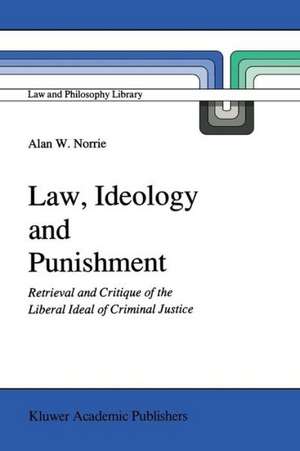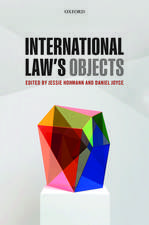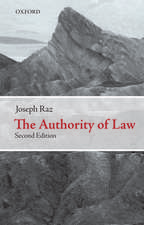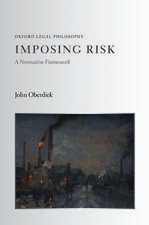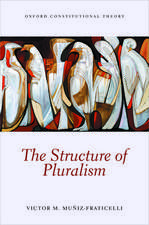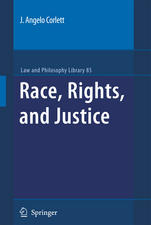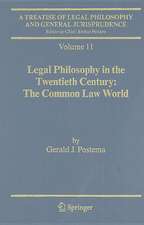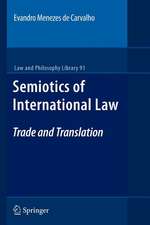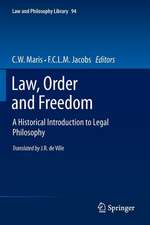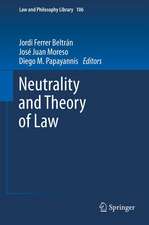Law, Ideology and Punishment: Retrieval and Critique of the Liberal Ideal of Criminal Justice: Law and Philosophy Library, cartea 12
Autor A.W. Norrieen Limba Engleză Paperback – 20 sep 2011
Din seria Law and Philosophy Library
- 20%
 Preț: 813.11 lei
Preț: 813.11 lei - 20%
 Preț: 569.00 lei
Preț: 569.00 lei - 18%
 Preț: 1225.16 lei
Preț: 1225.16 lei - 18%
 Preț: 950.66 lei
Preț: 950.66 lei - 15%
 Preț: 583.43 lei
Preț: 583.43 lei - 15%
 Preț: 639.25 lei
Preț: 639.25 lei - 15%
 Preț: 641.53 lei
Preț: 641.53 lei - 18%
 Preț: 893.84 lei
Preț: 893.84 lei - 24%
 Preț: 797.39 lei
Preț: 797.39 lei - 15%
 Preț: 579.84 lei
Preț: 579.84 lei - 15%
 Preț: 644.95 lei
Preț: 644.95 lei - 18%
 Preț: 895.76 lei
Preț: 895.76 lei - 15%
 Preț: 644.95 lei
Preț: 644.95 lei - 20%
 Preț: 571.85 lei
Preț: 571.85 lei - 15%
 Preț: 642.03 lei
Preț: 642.03 lei - 18%
 Preț: 1232.26 lei
Preț: 1232.26 lei - 18%
 Preț: 1116.05 lei
Preț: 1116.05 lei - 15%
 Preț: 655.92 lei
Preț: 655.92 lei - 18%
 Preț: 833.54 lei
Preț: 833.54 lei - 18%
 Preț: 898.26 lei
Preț: 898.26 lei - 18%
 Preț: 1016.63 lei
Preț: 1016.63 lei -
 Preț: 390.25 lei
Preț: 390.25 lei - 24%
 Preț: 700.89 lei
Preț: 700.89 lei - 18%
 Preț: 999.60 lei
Preț: 999.60 lei - 18%
 Preț: 1115.77 lei
Preț: 1115.77 lei - 18%
 Preț: 1107.88 lei
Preț: 1107.88 lei - 18%
 Preț: 781.94 lei
Preț: 781.94 lei - 24%
 Preț: 815.54 lei
Preț: 815.54 lei - 18%
 Preț: 786.18 lei
Preț: 786.18 lei - 18%
 Preț: 735.21 lei
Preț: 735.21 lei - 15%
 Preț: 653.33 lei
Preț: 653.33 lei - 18%
 Preț: 782.10 lei
Preț: 782.10 lei
Preț: 637.46 lei
Preț vechi: 749.95 lei
-15% Nou
Puncte Express: 956
Preț estimativ în valută:
122.02€ • 132.58$ • 102.56£
122.02€ • 132.58$ • 102.56£
Carte tipărită la comandă
Livrare economică 21 aprilie-05 mai
Preluare comenzi: 021 569.72.76
Specificații
ISBN-13: 9789401068000
ISBN-10: 9401068003
Pagini: 248
Ilustrații: 244 p.
Dimensiuni: 152 x 229 x 13 mm
Greutate: 0.34 kg
Ediția:1991
Editura: SPRINGER NETHERLANDS
Colecția Springer
Seria Law and Philosophy Library
Locul publicării:Dordrecht, Netherlands
ISBN-10: 9401068003
Pagini: 248
Ilustrații: 244 p.
Dimensiuni: 152 x 229 x 13 mm
Greutate: 0.34 kg
Ediția:1991
Editura: SPRINGER NETHERLANDS
Colecția Springer
Seria Law and Philosophy Library
Locul publicării:Dordrecht, Netherlands
Public țintă
ResearchCuprins
I. Law, Ideology and Punishment.- 1. Introduction: Critique and Retrieval of the Liberal Ideal of Criminal Justice.- 2. Between Appearance and Reality: the Contradictions of Legal Ideology.- 3. Juridical Ideology and the Philosophy of Punishment.- II. The Birth of Juridical Individualism: Hobbes and the Philosophy of Punishment.- 1. Introduction.- 2. Contradiction in the Hobbesian Philosophy of Punishment.- 3. Hobbes’s Juridical Individualism.- 4. Hobbes and the Historical Development of the Philosophy of Punishment.- 5. Conclusion.- III. Purifying Juridical Individualism: Kant’s Retributivism.- 1. Introduction.- 2. The Metaphysical Basis of Punishment.- 3. ‘A Theory Built on Tension’.- 4. Conclusion: Kant’s Juridical Individualism.- IV. Rationalising Juridical Individualism — and the Rise of ‘the Irrational’: Hegel.- 1. Introduction.- 2. The Hegelian Justification of Punishment.- 3.‘From the Point of View of Abstract Right’.- 4. Reason, Reality and the Irruption of ‘the Irrational’.- 5. Conclusion.- V. Abstract Right and the Socialisation of Wrong: Retributivism’s English Decline and Fall.- 1. Introduction.- 2. Revising the Classical Tradition:T.H.Green.- 3. Revising the Classical Tradition: Bradley and Bosanquet.- 4. Conclusion.- VI. Juridical Individualism and State Power: Utilitarianism in the Twentieth Century.- 1. Introduction.- 2.The Triumph of Utilitarianism.- 3. Utilitarianism and Individual Right.- 4. Conclusion.- VII. Juridical Individualism, Individual Freedom And Criminal Justice.- 1. Introduction.- 2. Defending Freewill.- 3. Freewill, Determinism and Criminal Justice.- 4. Conclusion.- VIII. Juridical individualism, State Power And Legal Reasoning.- 1. Introduction.- 2. Legal Reasoning and Criminal Responsibility.- 3. Speaking theLanguage of Law.- 4. Conclusion.- IX. The Limits of Legal Ideology.- 1. The Philosophical — Historical Development of the Liberal Ideal of Criminal Punishment.- 2. The Return to Kant.- 3. The Ideal and the Actual.
Recenzii
`Norrie's account of juridical individualism ... in the particular context of theorising about punishment strikes a clear chord with contemporary jurisprudence ... [and] makes a substantial and original contribution to significant areas of legal theoretical research ...
I would judge his contribution to our understanding of the philosophy of punishment to be among the most important to emerge in the last twenty years.
A most perceptive treatment of a socially and legally relevant issue.
I am particularly impressed by the skilful textual analysis ... and ... ability to relate classical political philosophy to contemporary issues ... It is critical scholarship at the best, incisive and relevant. It makes us sit up and re-assess conventional dogma, and anything that does that deserves praise and wide exposure.'
Michael Freeman, University College, London
` One of the most important contributions to the philosophy of of punishment in the last twenty years. '
Nicola Lacey, New College, Oxford
` His interpretations ... are always marked by penetration and acuity ..., are always interesting because they are carried out with great analytical skill and precision ... an author gifted with great critical skill ... a real and commendable achievement. ' (translation)
Professor Dr Rainer Raczyk, Heidelberg (Goltdammer's Archiv Strafrecht 1991)
` a scholarly and interesting work ... His is a good, careful and serious book. It is worthy both for its scholarship and for its integrity in putting forward carefully worked out views which, in this postmodern age, are perhaps not fashionable. It has broadened the scope of the modern debate because it has respected that [liberal] tradition.'
Zenon Bankowski, University of Edinburgh (Modern Law Review 1992, 55)
` This is a provocative and challenging book, which deserves careful attention from anyone who takes seriously the question of whether, and how, our system of criminal justice can be justified ... One of the signal merits of this book ... is that it forces us to confront the uncomfortable possibility that we cannot hope to make rational normative sense of our existing legal institutions. '
Professor Antony Duff, University of Stirling (Criminal Law Review 1992)
I would judge his contribution to our understanding of the philosophy of punishment to be among the most important to emerge in the last twenty years.
A most perceptive treatment of a socially and legally relevant issue.
I am particularly impressed by the skilful textual analysis ... and ... ability to relate classical political philosophy to contemporary issues ... It is critical scholarship at the best, incisive and relevant. It makes us sit up and re-assess conventional dogma, and anything that does that deserves praise and wide exposure.'
Michael Freeman, University College, London
` One of the most important contributions to the philosophy of of punishment in the last twenty years. '
Nicola Lacey, New College, Oxford
` His interpretations ... are always marked by penetration and acuity ..., are always interesting because they are carried out with great analytical skill and precision ... an author gifted with great critical skill ... a real and commendable achievement. ' (translation)
Professor Dr Rainer Raczyk, Heidelberg (Goltdammer's Archiv Strafrecht 1991)
` a scholarly and interesting work ... His is a good, careful and serious book. It is worthy both for its scholarship and for its integrity in putting forward carefully worked out views which, in this postmodern age, are perhaps not fashionable. It has broadened the scope of the modern debate because it has respected that [liberal] tradition.'
Zenon Bankowski, University of Edinburgh (Modern Law Review 1992, 55)
` This is a provocative and challenging book, which deserves careful attention from anyone who takes seriously the question of whether, and how, our system of criminal justice can be justified ... One of the signal merits of this book ... is that it forces us to confront the uncomfortable possibility that we cannot hope to make rational normative sense of our existing legal institutions. '
Professor Antony Duff, University of Stirling (Criminal Law Review 1992)
